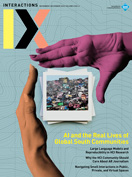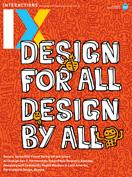Authors:
Max Krüger, Ana Duarte, Anne Weibert, Konstantin Aal, Reem Talhouk, Oussama Metatla
At its very core, participatory design (PD) is concerned with issues of power [1]. Since PD's earliest applications, the aim has been to make voices heard and provide agency through participation in the design of technological artifacts, infrastructures, and processes. But participation does not happen by itself, and what participation means differs from time to time, place to place, and culture to culture. It needs to be actively constructed and adapted to the present conditions. To do this, PD practitioners must be mindful of the existing power relations not just between participants and the rest of the world, but…
You must be a member of SIGCHI, a subscriber to ACM's Digital Library, or an interactions subscriber to read the full text of this article.
GET ACCESS
Join ACM SIGCHIIn addition to all of the professional benefits of being a SIGCHI member, members get full access to interactions online content and receive the print version of the magazine bimonthly.
Subscribe to the ACM Digital Library
Get access to all interactions content online and the entire archive of ACM publications dating back to 1954. (Please check with your institution to see if it already has a subscription.)
Subscribe to interactions
Get full access to interactions online content and receive the print version of the magazine bimonthly.





